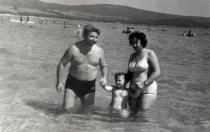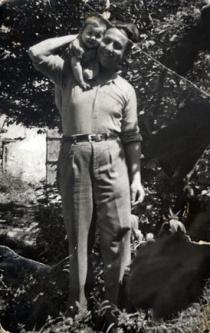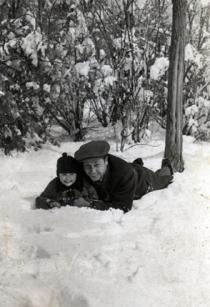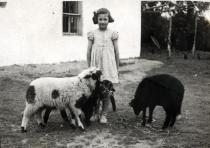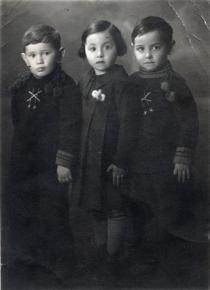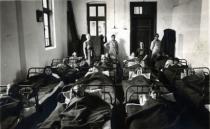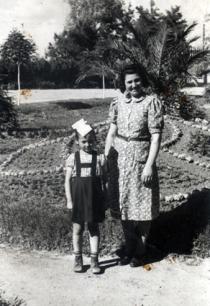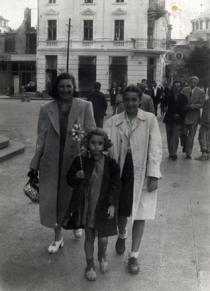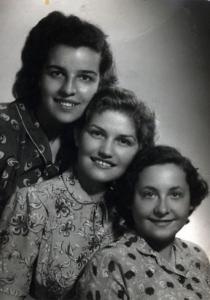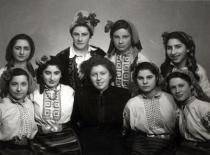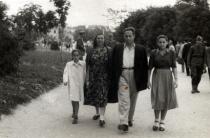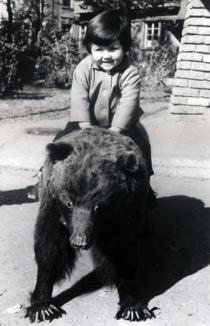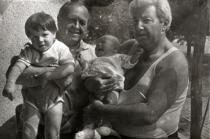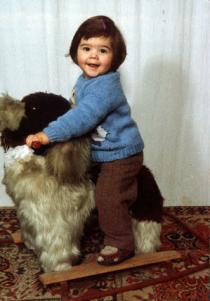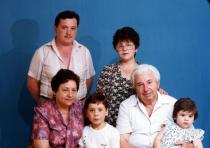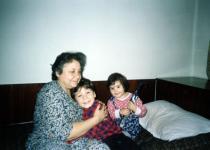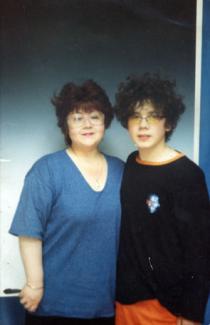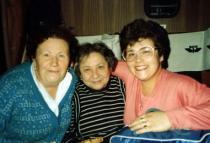
Berta Ezra Pando (nee Dzhaldeti)
Plovdiv
Bulgaria
Interviewer: Svetlana Avdala
Date of inteview: May 1996
‘I have been living in Plovdiv for such a long a time but I will always feel like a citizen of the town of Yambol!’ says Berta at our first meeting. She used to always arrive on time. Her body seemed slightly bent; it was as if she was diffident all the time. She was always with her husband who was already ill at the time. She didn’t show any signs of impatience or irritation towards him, not even at a single occasion. She had accepted things as they were. When you are with Berta you can feel the cozy atmosphere of the little town. It is a pleasure to be with her because she is an ordinary, modest, helpful person, without unnecessary whims. The conversations were going well. It was easy for me to lead it and to foresee what was going to come next. The facts were presented in a traditional, normal way. Nothing special. And all of a sudden a little end of the curtain was lifted and God made a manifestation of himself…I keep on wondering whether I became religious because of these interviews and my meetings with all these people. Because things seem so logical, even predestined, especially from the point of a view of a life that is almost over.
My name is Berta Ezra nee Dzhaldeti, Pando by marriage. I was born on 10th September 1935. I have a sister – Rika Dzhaldeti (1943 – 1994). I am married to Haim Mois Pando (1923). I have a daughter whose name is Stela and who is married to Isak Benaroy. I also have two grandchildren – Mois and Alberta.
We are Ladino Jews [1]. My paternal grandfather, whose name was Israel Dzhaldeti (? – 1933), was born in Yambol, he was a dairyman and he married twice. His first wife’s name was Rebeka, his second wife’s – Berta. We are from Berta’s offspring. My grandpa was born in Yambol [in Southeast Bulgaria, 261 km from Sofia] and was living there. He got married in Yambol. Grandpa had five children from his first wife Rebeka – Albert (who died during World War I), Estrea, Yeashua, Ester, Fortunae and he had five children from his second wife Berta – Rebeka, David, Soultana, my father – Ezra, Matilda. I don’t have any memories of granny Berta because I was three months old when she died of asthma in 1935 in Yambol.
My maternal grandfather’s name was Yako. I don’t know when and where he was born. I don’t have memories of him because he died in 1914 during the war, a long time before my parents got married. My maternal grandmother’s name was Rika Azis. She was born in Odrin. She had two marriages – her first husband’s name was Yako Levi – a Turkish Jew, who was my mother’s father. Granny’s second husband was David Azis. Each of her marriages lasted for three years because both her husbands died. I remember her well and I think that she used to be a very pretty old lady. That was what I was thinking as a child because I loved her very much. I was her first grandchild and she was looking after me till I started junior high school. I used to sleep and live at her place during the week and went to mum and dad at the weekend because my parents used to work a lot and were extremely busy. Granny Rika wasn’t very old, she was fifty-something. Her hair was absolutely white; she used to make a little bun at the back of her head. She only had two or three teeth in her mouth. She was of medium height, slender and very lively and active.
Granny talked to me in Ladino and I replied in Bulgarian. That was the way we were speaking with her. In fact we were very close. I felt her like my closest confidante and shared what had happened to me with her. She didn’t have much time to tell me fairy tales and to sing songs to me but our communication was rather intense. I remember she was telling me not to lie and never to touch anything that didn’t belong to me.
My granny was leading a life of poverty. Her house was tiny. They had started building it together with grandpa but when he died the house remained unfinished – one of the rooms was grouted with mud and on the floor of the corridor hall there were boards. There was one more room and a tiny hall where uncle Albert used to live. The kitchen was outside, in the little yard. There was a hearth and chimney, as well as a hob – the so-called ‘mangal’ on coal, on which we used to cook. There used to be only fruit-trees in the garden – plum-trees, quinces, an apple-tree. There was also a vine-arbor. There wasn’t a fence around the garden but a real hedge. We didn’t have any domestic animals but I recall that we had a lamb one year. There was neither fountain in the garden, nor running water. I used to walk for two blocks to fetch water and we weren’t the only ones to do so – all the people from the neighborhood used to fetch water from that fountain. The toilet used to be out in the yard. A lavatory with a hole on the floor in a little cabin. I fell in the hole once as a child. We didn’t have electricity, we were using gas lamps. In winter we were using stoves on wood – the so-called ‘gypsy love’.
My aunt Souzana used to live at granny’s place as well – she was my mom’s stepsister who wasn’t married at the time. Uncle Albert, his wife Olga and their son David were living there too. My uncle used to drink a lot and he was unbearable when drunk - he used to become extremely aggressive. And at such occasions aunt Olga and my other aunt – Souzana – would close all the windows, lock the doors and hide into the house. He would come back home, leave no stone unturned, bump into things, until going to bed and falling asleep. Whenever aunt Olga saw him coming home drunk, she used to flee the house - not through the door but through the window so that he wouldn’t see what was going on – and then run to the neighbors. And on coming into the house he started throwing things, smashing, breaking and then he would go to bed. After his falling asleep, auntie Olga used to come back home and clean everything and in the morning there wasn’t a better person in the world than uncle Albert. There were cases like that – uncle would go out, make a trick of some sort and win some money, then he would put on a new overcoat, a suit, a bowler hat and would go out with friends in the evening. Later he would return with no overcoat, no hat, no nothing. There was such a case – they got drunk, he and his friends, there was some street-organ and he liked it so he bought it in the end. He had the money at that moment so he bought it just like that and then came home drunk with a gift for Olga – a street-organ. It used to stay there in the room, that street-organ, until they left for Israel.
My aunt Souzana used to provide for us – my mother’s stepsister, who was still living with granny. She used to work as a milliner at a workshop which belonged to a Bulgarian guy. We used to have a great relationship with my aunt. Later on she got married, in 1942 – 1943 and left for the town of Stara Zagora [a city in Central Bulgaria, 192 km from Sofia]. My aunt used to be very fastidious. I recall that every Friday the furniture was taken out, in the garden as in those years we used to have fleas and bed-bugs and it was normal because the floor was made of mud. So we would take everything out and we used to beat some things and pour boiling water on other things. For Pesach the entire cutlery was boiled and the houses were whitewashed. That was what granny was doing and that was what mum was doing.
On Friday only the women went to the public bath. It was Roman, new and very nice, with mineral water. It was made of marble. There was a pool, showers, bidets and even a sauna for to get very warm. The people would stay there in the steam so that all the dirt would go easily off their skin. We would go there with aunt Souzana – she would take me there and every time we took apples and cookies. We would stay there for hours. Afterwards we would climb the internal staircase in our towels and go to the second floor. The bath was downstairs and the beds – upstairs. There we would take a short rest.
There was one main street in Yambol – with a lot of shops. It was paved as well as the other big streets. The others were cobblestone secondary streets. The Police Department was in the Shopping Street as well. One of the distinctive features of Yambol are the so-called ‘Hali’ [the central covered market]. They date back to Roman times. They were really picturesque and ancient. They still exist but have been turned into a shopping center. They are situated right in the center of the town square. There are domes on them and arcs instead of doors. There were doors from the four main directions – east, west, north and south – so that people could enter from any direction. We usually used the eastern door. The butchers were on the right – one next to the other – all the meat merchants. Right opposite were the greengroceries and the fishmongers after the door. I remember very well. I used to go shopping with mum once a week but I also went with dad to buy minced meat for the meat fingers – ‘kebapcheta’ as he was a ‘kebapcheta’ maker.
Granny Rika’s house, where I used to live till starting primary school, was in the ‘Dolnata’ [Bulgarian for lower] Neighborhood, near the Toundzha River and the Shopping Street. There used to live mainly Jewish families, rarely was there a Bulgarian one. That’s why that district was known as the Jewish Neighborhood and it was something like a ghetto. I can state that all our neighbors were Jews. All my father’s brothers and sisters used to live in this lower neighborhood. There was also an upper neighborhood where my parents were living. The Turkish people lived in a separated neighborhood. We didn’t communicate with them a lot. Their neighborhood was near the hill ‘Baira’ (there was this hill which was called ‘Baira'), to the other end of the town. And the gypsy neighborhood was near the Turkish one whereas the Jewish Neighborhood was in the lower part of the town, near the Toundzha River. There were some Armenian families as well that were scattered throughout the town but didn’t have their own neighborhood. In the ‘Gorna’ [Upper] Neighborhood, where my parents were living, used to be the houses of the well-to-do families. In that neighborhood there were some Bulgarian families.
The people living in the Lower Neighborhood were very close indeed, in wonderful relationships. If you were in need of anything – advice, help, you could turn to your neighbor. There weren’t fences around the houses. When we needed something – tell your neighbor this, tell him that, do you have this, do you have that…They were borrowing and lending things, they were gathering in the evenings on a little square which was in the center of the neighborhood. Each person would carry their own chair and a conversation would start right away, they were chatting all the time. They were preparing together jam, tomato sauce called ‘liutenitsa’, ‘fideus’. My granny was a great expert on ‘fideus’. It was something like noodle which wasn’t cut into big pieces as usual. We were just waiting for the sheets of pastry to get a little dry, then we used to fold them and cut them afterwards. The pieces look like spaghetti. When the women of a household decide to prepare ‘fideus’, they would call other women from the neighborhood and cook in one of the houses, next time they would cook in another woman’s house. The same thing when ‘liutenitsa’ was prepared – all the people would gather and work together. A lot of jam was prepared because there were lots of plums and again all the neighbors took part.
We the children used to play a lot. I was together with my cousins. Aunt Ester, who used to live in the lower neighborhood, had five daughters – Rebeka, Gratsia, Sofi, Berta, Meriam. The second and the third sons of uncle Yeshua – Shimon and Israel were almost my age. We used to play all sorts of games. We liked to play ‘chilik’, hide-and-seek, play tag, ‘long donkey’, ‘short donkey’, we were hopping over each other. There were some vegetable gardens that were called ‘bakhchi’. We were taking walks in the ‘bakhchi’, climbing trees, picking plums, picking mulberries…The Toundzha was nearby so we used to go there to wade into it…Our parents didn’t control us at all, nobody was taking care of us… There were neither cars nor any other dangers. If a cart went by, we would jump at the back until the people chased us away. I lived with granny until I turned thirteen and started the junior high school.
Granny was religious and used to take me to the synagogue. It is a very beautiful building in my childhood memories. Downstairs there was a hall with a dome decorated with tainted glass. There were a lot of seats in it. That light coming from above hued in different colors seemed magnificently beautiful to me… The men would sit downstairs and the women upstairs on the balcony. There was also an entrance-hall from which the women headed for the balcony and the men remained downstairs. The women were wearing their newest clothes and were always with kerchiefs on their heads. Granny didn’t have a lot of dresses – only one formal and she used to wear it every Friday. Men would put on ‘kippah’. I was feeling very important but just the first fifteen minutes after which I used to get bored and started fidgeting on which granny would tell me to go to the yard. There was a large yard that surrounded the synagogue. There was a separate place for slaying animals. There was another separate building where the ‘shammash’ used to live – that was the person who was taking care of the building of the synagogue.
Granny was always fasting at Kippur. She was trying to make me follow suit but whenever I started crying because of being hungry she would give me something to eat. Taanit would end with a mass in the synagogue. On returning home we would first have a little slice of bread with a pinch of salt and then we would sit at the table where a lot of delicious dishes were served – I don’t exactly remember if there were leeks balls but I recall that the dishes were extremely tasty.
I don’t have any recollection of granny Berta Dzhaldeti (? – 1935); I only know that she was a rather domineering lady. As mum comes from a very poor family she wasn't accepted by granny Berta because mum didn’t have a dowry whereas my dad’s family was quite well-off – all of them were craftsmen. And on top of that, according to mum’s words, dad was a very popular man. Despite all the negative factors, the love between mum and dad was extremely strong. His parents, that means my grandmother because my grandfather was already dead (he died in 1932), didn’t give her consent. I have heard that at the time there was a man called grandfather Avram – something like a chieftain and all the people were seeking his advice and took his words into consideration. My dad went to him when he met my mother and afterwards set his mind on marrying her. That chieftain gave his consent and with the permission of the parents they got engaged. They were engaged for two years and for those two years mum was obliged to gather her dowry. And uncle Yeshua and dad worked hard during those two years and saved the money without informing their parents. The saved money they put into my mother’s bank account. And when there was enough money for the dowry, the parents, or my granny to be precise – my father’s mother – Berta gave their consent for the marriage. Dad and mum got married in 1934 in the synagogue in Yambol observing all the rituals.
Mum has told me that after getting married they started living with granny Berta in the big family house in the Lower Neighborhood. They were given a room that was facing the staircase. Mum used to tell me that granny had a big case in her room. The key from the case was kept in her skirts. Every time they came back home the old lady would lift her skirt and take the key out, then she would unlock the case, put inside the things they had brought, lock it again and hide the key. Mum was also saying that while she was pregnant, dad would bring her something – apples or grapes and on passing the room they were occupying with mum, would drop something through the window. There was something under the window – a sofa, or some other piece of furniture – so that his mother wouldn’t see that he was giving something to his wife. The rest he would give to the old woman and she put it in the case. They were eating only what she had decided to give them from the case. There were no protests – that was it – matriarchy. The whole family used to live in the big family house until my grandmother’s death. I remember that house. There were two rooms on the ground floor and a big kitchen. There the family was doing the washing, the cooking, the washing up. There was also a big corridor hall, a big bedroom and a little room. In the backyard there was something like a toilet and a summer kitchen. At my time there was living only uncle Yeshua with his sons and after 9th September for some time uncle David and auntie Bouka. Grandfather Israel died in 1932 and grandmother – in 1935. After her death mum and dad went to live somewhere else. At first they lived with an Armenian family and then rented rooms on the ground floor in the Upper Neighborhood. The owners were Jews. I only remember their first names, not their surname. I recall grandpa Moshe who had a son Yako, a daughter Rashel and a daughter-in-law Sofi.
Only kosher was cooked at granny Rika’s house. Pork was never brought into the house, she didn’t mix meat with dairy products, she was cooking in separate pots and when visiting mum she was always carrying her own meal because my mum’s dishes weren’t kosher. I even remember that dad was bringing home pork. We would often eat bacon with garlic in the evening.
On holidays and at the weekend I would go to my parents. Before the Holocaust we were convening with dad’s family in the Big family house. One of the women would make leek balls, another – something else, everything was very delicious. There would invariably be some meat on the table – usually lamb. Everybody would cook and then the dishes were brought to the table around which we gathered. We, the numerous children, would have great time under the table.
I remember that at Purim ‘mavlacheta’ were being made – in the form of the letters and we would take the bagel with the letter that was the first letter of our names. At Frutas [2] we were given bags full of different fruit. I felt at home both with granny and with my parents but I think I felt better with my parents. They were living in the Upper Neighborhood which wasn’t far from the Lower one.
My father Ezra Israel Dzhaldeti (1904 – 1968) was a very energetic, very practical and resourceful person. He was quite wild when he was young. In 1923–24, during the September uprising [Events of 1923] [3], he used to be keen on anarchism. And during those riotous years he and two or three other men were sentenced to death as anarchists. But he succeeded in escaping to Turkey by using a fake passport. He lived in Turkey for a year and a half. Afterwards there was an act of grace. And later on, when things in Bulgaria settled down a little, he returned to Yambol. There, in Turkey, he worked as a shoemaker, an assistant-shoemaker, a journeyman and he managed to make a pair of tourist shoes with a hole for a gun in the sole and that was how he returned from Turkey – with a gun in the sole of his shoe. But when he returned to Yambol his brother Yeshua and his father, my grandpa Israel, were so sacred that they almost made him jump and hide into the lavatory.
After getting married he settled down and started making ‘kebapcheta’ meat fingers so he settled down because he was short of time. And that was how, in a natural way, he gave up his political activities. He wasn’t a member of any Jewish organizations. He became a member of the Bulgarian Communist Party [BCP] [4] only after 9th September 1944 [5].
His father was a dairyman. He was a dairyman, his uncle was a dairyman – I’m telling you about my family. My two uncles Yeshua and David were tinsmiths, all of them were craftsmen. Grandpa Israel had built a dairy shop apart from the house and dad inherited it. They also had a Big family house in the Dolna Neighborhood. Dad has a lot of brothers and sisters. All of them were craftsmen and all of them gave up their shares of the shop in my father’s favor because he was the last one to live with his parents.
At first my father started selling milk and after that put some tables in the shop itself. Later on he put some tables on the sidewalk and it turned out to be something between an inn and a shop. There were seven or eight tables inside the shop and four or five outside. Every evening a lot of people gathered here, mostly Jews but not only. It was so noisy! My dad was known as uncle Ezrata. He was very sociable and used to attract a lot of customers. He used to have heaps of friends – Jews and Bulgarians. In front of his shop there was an enormous sign that read: ‘Dairy and Kebapcheta Shop Ezra Dzhaldeti Kosher’. Kosher was written both in Hebrew and in Bulgarian. And as a matter of fact he obeyed all the rules of kosher. The ‘kebapcheta’ were made from lamb and veal or from mutton and veal. He used to sell milk only in the morning and ‘kebapcheta’ – only in the evening.
Not only did my father sell the milk, he also processed it. People from the nearby villages would bring the milk to him in the morning. He put it on the hob to boil, then poured it into some basins, leavened it and at dusk he would start making ‘kebapcheta’. Such were those basins – for four or five liters of milk. He used to sell the milk in the shop which was in the Gorna Neighborhood. My parents used to get up at 1.30 or 2 o’clock at night and would go to the shop to uncover the milk which was almost ready. In that shop there were some huge cases with shelves in them – there they used to put the basins with the milk and after it was ready they had to uncover it so that the yogurt could breathe and lower its temperature. In the morning they took it downstairs to the cellar, the cellar was made for that purpose. It was exactly under the shop and was three meters high. When the house was demolished it turned out the walls were more than sixty centimeters wide… So, they would take the yogurt downstairs, to make it cold and the one from the previous day would be taken up to the shop so that they could sell it. And it was yogurt difficult to describe – it was as thick as cheese, as butter… And when dad started to cut it, he used to have that spoon made from tin that was almost flat, and he dipped it into the yogurt and take some out of the basin – and the yogurt stayed like that, like a slice made of milk and when a person wanted to buy yogurt that was what he would do – dip the spoon into the basin and put two or three such slices into a bowl – as much as the customer wanted. After finishing work with the milk, dad started work on the meat. He was preparing it into a wooden trough in order to make the minced meat for the ‘kebapcheta’. He would leave blocks of ice underneath the trough in so that the meat would stay cold… Ice was sold at that time. There used to be an ice-selling cart that was passing through the neighborhood, I don’t know, they were making it somewhere… He used to buy six or seven blocks of ice every day. In the evening my parents would start grilling the meat - ‘kebapcheta’, liver, lamb sweetbreads…Dad used to make the minced meat and grill the ‘kebapcheta’. That was something only he was doing. Mum used to help in everything else. She was a waitress and a cleaner most of all.
My father became a member of the [communist] party after 9th September [1944] but I recall such a case during the Holocaust. Our neighbors were Jews and we gathered – either at our place or at some neighbor's. The adults were playing cards, poker with beans because they didn’t have money. Four or five families used to spend the evenings together – the women were playing on one of the tables, the men – on another, and we the children under the table to and fro and in the dark, outside, because we were living close together, so we could go home whenever we wished at that time…One day they had covered the window with a blanket and papa called us ‘Come here now. I want to show you something.’ He took the older children with him but we, the younger ones, joined them and he broke some toothpicks in two. He broke five toothpicks right in the middle and he arranged them on his hand, dropped some water on them and because of the water the picks moved and a David’s star appeared. My father was not a member of the Jewish community. There wasn’t anything like that at the time in Yambol.
My mother Fortunae Yako Revy Dzhaldeti (1912-1981) was a humble and sensible woman. She was of medium height, with black hair, very agile and very laborious. She seemed very pretty to me and to my father, I guess, as he wanted to marry her so badly… She used to tell me off from time to time, she even slapped me because I wasn’t a very good child. I was pretty wild to be honest. My knees were always bruised. I used to fall all the time, or hit myself… I was playing together with the boys. As the Jewish School was in the lower parts of the town, and it was snowing, and there was a lot of snow at that time, mind you, I would put the bag on the ground, sit on it and slide down the hill. It was like a real slide. Mum would always warn me not to tear my clothes on that slide. One year the bag simply couldn’t take it any more. We used to also go on top of the Toundzha River because it was nearby and would invariably freeze in winter so we used to go there to slide. Mum was always telling me off, especially when she had got fidgets. She was very angry because she worked too much. Dad didn’t use to tell me off at all.
My mother was an excellent cook and from her I learned how to prepare very nice pastel. You sift half a kilo of flour with a packet of baking powder, a little salt and one egg. After that I make a little well in the middle of the flour heap. In it I pour half a cup of vegetable oil, even a bit more and half a cup of yogurt with half a spoonful of baking soda stirred in it. I knead soft dough. I separate it into two parts – one of them slightly bigger than the other, I knead it into a ball and with the bigger rolling pin or a bottle, if you don’t have a rolling pin, I roll out the dough to fit the baking dish. I use medium size baking dish. The bigger ball of dough I flat out and put on top – in that way I’m sure the filling will not drip out. I put the filling, roll out the other sheet of dough and put it on top. When I put the first sheet of dough in the baking dish I make some holes in it with a fork – so that the dough wouldn’t rise and the air wouldn’t go out.
The filling – a well baked aubergine, chopped into tiny bits or hammered with a knife or a wooden spoon and 250 grams minced meat. A pinch of salt, black pepper and I fry all this. I don’t even put oil in the pan because there is enough fat in the meat. I also put one egg in the filling, after the meat has been fried, after I have taken the pan away from the hob and the filling has gone a little cold. So I put the filling, place the other sheet on top, press the endings with fingers so that the filling would stay in, make holes in the upper sheet with a fork and bake. I heat the oven to 200 degrees and when the dough is not sticky any more I know the dish is ready. That’s it. You can make a filling from spinach, cheese and eggs.
Our family always ate together – at breakfast, lunch and dinner. We waited for dad to sit at the table and then we sat down. My father used to buy the products and mum did the cooking. Usually at the table we discussed everyday topics, the things we were going to do or what has happened during the day. Dad didn’t like it when we were talking too much while eating so we usually had our meals in silence.
My parents’ house was in the Upper Neighborhood. They had rented some rooms in a basement. Before that they had lived with granny Berta who was a very authoritative woman. They had two rooms in that basement. One of them faced north and was very damp and practically nobody lived in it nonetheless it was furnished. We were living in the room that faced south. There was a small kitchen which was probably meant to be a washing room. We used to cook in an ‘odzhak’ [a hearth] and on ‘mangal’ [a brazier]. The toilet was in the house. There was running water in the house. There was no garden at all. The furniture – a bedroom suite, a nice wardrobe with a mirror on the middle door, a little bed for me, a stove, a table. The owners of the house used to live above the basement. They were Jews as well. We were on friendly terms with them. Inside, from the dark room, as we called it, there started a wooden staircase that we used to climb to their part of the house. During the Holocaust when there were restrictions on when to leave the house and on everything in general, we used to celebrate Pesach and other holidays with our landlords… regardless of the fact that there were restrictions. The windows were covered in black paper because of the air raids – so that no light would be let out. We would go upstairs and live in that way… I used to spend the holidays with my parents, not with my grandmother.
So, with our neighbors, who used to be our friends, we prepared superb meals, we used to make matzah, boyos. But not like the matzah we have these days, it was more like home made round loaves. And for eight days we used to eat only boyos without salt. They were hard and not very tasty. We couldn’t wait for it to finish so that we could have some real bread. And indeed we didn’t buy bread for eight days.
The period of the Holocaust coincided with my years at the nursery and primary schools. Almost all Jewish children attended one and the same nursery. It was mixed and there were children of Turkish, Jewish, Armenian origin. When the Holocaust started we, the Jewish children, somehow got isolated. Most probably that was done by the other children under the influence of their parents. I recall a child called me ‘chifutka’ [6]. I remember that may be because of that incident the teacher made a parents’ meeting and said that the Jewish children are no longer allowed to attend the nursery. We were expelled because of being Jews. There were about ten of us. And our parents were really worried. Then, one summer, they decided to take us to a Catholic nursery but we were turned out of there too. I also recall that Tsar Boris III [7] died at that time. And the other thing I can’t forget is that all day long the nuns would teach us how to pray.
In 1942 I enrolled in the Jewish school and I studied there until the fourth form. It was situated just between the Lower and Upper Neighborhood, next to the synagogue. It was in a large, beautiful building. There was a separate room for every class. In each class there were between 20 and 25 children. In that same 1942 it was turned into a police department and the school was moved to two rooms in the synagogue. The rumor had it that a lot of people were tortured in that police department. Some people had seen the police officers covered in blood. It was an absolutely horrible situation. In the new premises there were two classes in each room and usually two or three kids had to sit at one and the same desk. The first and the second form studied together in our room. And it was the staff room as well. There were three teachers. I can’t recall the name of the first one, Miss Rashel and Mr Leon. The teacher, whose name I can’t remember, was teaching Hebrew, but I couldn’t learn anything in that language. Miss Rashel was teaching Algebra, Art…, Mr Leon – Bulgarian. I didn’t have favorite subjects. I remember some of my friends’ names – Ancheto, Amada, Stela, Izako. I didn’t use to be a brilliant student, I was somewhere in the middle. I didn’t participate in any clubs. After 9th September [1944] the building of the Jewish school was restored to its original functions, but it was turned into a Bulgarian school this time. After the Jewish school, in 1945, I enrolled in a Bulgarian junior high school – Junior High School I. There I also made some friends – Ema, Roumyana, Mimi Sheytanova, Diana…
In 1942 the adults had to wear badges [Yellow star in Bulgaria] [8] but I hadn’t turned twelve and didn’t wear one. That was an advantage for the children because due to the restrictions imposed by the curfew only we could do the shopping. In the first years the curfew started at 9 p.m. and I recall that my parents used to meet with other Jewish families at dusk in the city garden, around which flows the Toundzha River. They were there together with the kids. I remember that when the curfew was introduced and we started going home earlier, while the sun was still shining, I would always ask mum ‘Why are we going home so early?’. She always said: ‘Because that is what we have to do.’
They didn’t comment but there was a period when they were very worried especially when more restrictions to our going out were introduced – we were allowed to be out only for two hours a day; we weren’t allowed to use the main streets, only the secondary. Afterwards the people interned from Sofia and Plovdiv arrived [Internment of Jews in Bulgaria] [9]. Our house was rented and very little so nobody was accommodated at our place. There was also a soup kitchen.
During the Holocaust my father’s job became totally rudimentary [Law for the Protection of the Nation] [10]. He was forbidden to practise it – both the dairy products and the meat fingers – and he gave away all the tools and vessels (grills, big pots, basins) to a neighbor – uncle Angel, who used to be a friend of my father’s. Angel wanted to take all these objects, hide them and pretend that he had bought them. He gave everything back to my dad after 9th September [1944]. The shop was closed but not seized. I can’t say if dad was made to pay taxes for it. Dad was mobilized into the forced labor camps [11]. I can’t say exactly where he was but he used to go there early in spring and returned in late autumn.
Mum had to support the family. She was from a poor family and before getting married, she had worked together with her mother, brother and sister in a workshop in Elkhovo where they used to make traditional Bulgarian costumes. Mum used to weave the tinsel stripes which were used to trim the costumes. She used to make them on a loom at home. So at that time she was forced to start this activity again. My cousins were making bead necklaces. I can’t say where they were being sold – neither the tinsel, nor the necklaces. We were giving them to some merchants and they were selling them in the nearby villages. Surviving was difficult.
I remember that one of my father’s suppliers of milk visited us once and he took me to a village near Yambol. I guess my father had made an arrangement with him. We went to the village by cart. It must have been at threshing time because I recall I and the children from the village were sliding with the threshing-board all day long. And in the evening they put 4 or 5 kilos of flour in a bag and returned me with that same cart to the outskirts of Yambol – at that time trade on the black market was severely punished. So they gave me a bag of flour and let me go. And, as I had to go through a neighborhood called ‘Karbona’ on my way home, I recall the bag was very heavy and it was extremely difficult for me to walk and to reach home.
My father fell ill in 1943. He got some horrifying neuralgia of the three-headed neuron and he was operated in 1943 in Sofia by professor Filipov. Traveling was forbidden for us at that time but that was some rare malady and they sort of experimented on dad, he was a test animal. Thank God, the operation was successful in spite of being difficult and complicated. It lasted for eight and a half hours and it was the first of the kind in Bulgaria, the eighth in the whole world. Dad had read that in some magazine. And exactly at that time my sister came into this world. My sister was born in 1943 in the basement. The delivery was guided by a midwife called Rayna. She had helped at my birth as well.
I remember that moment very well because there is a difference of eight and a half years between us. I wasn’t such a young child anymore and I remember how mum’s labor started. Then, they made me move to the dark room to sleep in. At some pint in the early morning papa came to me and woke me up; ‘Come on, Betty, get up, you have a sister.’ I jumped out of bed, they were bathing her, my little sister… It was so difficult. My mother had a lot of milk. I remember that the owners of the house, who were living above us, had a daughter as well. Her husband was from Sofia and they used to live there but they were interned to Yambol – they started living with her father and brother. That daughter, whose name I simply can’t remember, gave birth at the same time like mum. Her milk was too thick and that was making the baby constipated. So, she was taking down the baby every day so that mum could breastfeed it because mum had milk in excess. So mum was breastfeeding both of them. It seemed to me that more children were born at that time no matter the situation was extremely unfavorable. There was no problem with the nappies because mum was using what was left from my childhood. Nothing was thrown out in the past.
There is a difference of eight years between me and my sister Rika Ezra Dzhaldeti (1943 – 1994) and we were in close contact until 1949 when I had to go to Sofia to study. She was very young but I remember she was crying all the time – ‘I want with Betty, I want with Betty.’ So mum would always make me take Rika on my walks in Yambol. And when we turned around the corner and mum couldn’t see us, I would always slap her and send her back. I was a pretty grown-up girl at the time and she always wanted to come with me. Then I went to study in Sofia and then got married. When we had already moved to Plovdiv she came there to study at the college of medicine, to become a laboratory technician. Later on, she returned to Yambol and there she was working as a laboratory technician at the hospital. She didn’t succeed in getting married after all. I was communicating with her more actively in the last few years. She even died while living here with us, in Plovdiv. She got ill and lived here with us for four months, we were taking care of her. She died on her way from Plovdiv to Yambol, where she had to be hospitalized for blood transfusion. She was buried in Yambol.
I recall that during the Holocaust the communists and the members of UYW [12] were interned to a camp in Kailuka [13]. They were isolated there. It was something like a concentration camp. As a matter of fact all the families with partisans in them were interned there. Some of them managed to break away from the camp like Mati Roubenova. She was something like an organizer of the Jewish young people for the partisan movement. One of my cousins, Israel, Naftali’s brother, became a partisan. They were hiding in the mountains around Yambol.
Another cousin of mine, Albert Dzhaldeti, who was known like Dzhaldo by everyone, was a communist and spent three years in jail. There were my relatives in Kailuka, too – my uncle Davidcho, his wife, my younger cousin Naftali. And just before 9th September [1944] there was a fire in the camp which took the lives of lots of people. Three people from Yambol died there. Among them was grandpa Avram – the elder. He was the oldest person in the camp. Uncle Davidcho was just a little scorched. Tanti Bouka, his wife, was seriously burnt. My younger cousin had some wounds too – on his arm and head. When they returned they were in wounds. There were no medicines. I remember we used only flavin and changed the bandages. I recall that once, when I started removing Naftali’s bandage from the head where he had a very deep wound, there started falling white worms from the flesh. That cousin of mine survived but after all he had gone through he got valvular disease as a consequence to the rheumatism he had caught in the camp and the burning. The wounds healed but the valvular disease remained. He took to his bed and died at 21. His brother, Israel, came back from the Balkan Mountain alive and kicking, he went to the front as a volunteer and was killed on 25th December 1944. As a matter of fact almost everybody from the family survived apart from those two guys. I remember that on 9th September 1944, when the partisans returned, we were waiting for them in front of the Jewish school. They were on lorries, which stopped there, in front of the school. Tanti Bouka was still in bandages and we were waiting, and waiting, and waiting for uncle Elko (Israel) - the partisan, we used to call him uncle Elko. She lost hope and went back to our family house, she was sitting there, not knowing what to do. And at one time, the last lorries came and – there was uncle Elko. I ran to tanti Bouka to tell her… She was sitting on the stairs just like the sculpture ‘The Mother’ which is in front of Dimcho Debelyanov’s [14] House-Museum – sitting on the stairs just like that, leaning her head on her hand… it is as if I can still see her… And I shouted from far away: ‘Tanti Bouka, uncle Elko is back!’ She didn’t know if he was dead or alive, if he was going to return or not, because Nati Roubenova died, uncle Avramcho – a neighbor, died too.
After 9th September [1944] my father’s private business was done with. Until retirement, he worked as a manager of a confectionery, which wasn’t his, and mum helped him. Dad decided to turn our shop into a place for living for us because he had heard that our neighbor's shop was being nationalized so he thought the same would happen with ours. So he built a wall in the middle of the shop and we got two small rooms and a little hall – there was a separate bedroom and the other room served as a kitchen, living room, everything…
Aunt Souzana had married in Stara Zagora. She decided to leave with her family – with her husband and her son David, who was a year old – for Israel in 1948–1949 [Mass Aliyah] [15]. In a year’s time her brother David went there together with his wife Olga and their child. There they had two more children. Afterwards her mother went there too – my granny in 1950 or 51. She sold the house and paid for the journey with that money. My mother wanted us to leave for Israel very much because almost all her relatives emigrated but papa laid down a condition: ‘If you want to go, go, but I and the children will stay here.’ So we stayed. At that time everything was ready, even the documents but dad remained on his position. I don’t know why. Even now I feverishly believe that I have to stay here and I didn’t agree to leave for Israel then or later.
Uncle Yeshua’s son, Albert, stayed in the Big family house and lived there. After 9th September [1944] my cousin, who had been in jail, started work at the Ministry of Interior and became an investigator.
In 1949 I went to Sofia to study there. They had just opened a boarding house and a vocational school sponsored by Joint [16]. They called it ORT [17]. It was situated near Rouski Monument whereas the boarding house was on 20 ‘Pozitano’ Street, next to the Jewish school. In the first year there was only me and three other girls. In the second – there were eight girls form all over Bulgaria, in the third – fifteen. In the first year there were 52 boys and 4 girls. The person in charge of the boarding house was Rouzha Isakova. At that time she was 61 – a learned, intelligent woman. There we, the kids from the remote part of the country, learned manners and general culture. All that I know I have learned from her – how to eat with fork and knife; at home, to be honest, nobody was using knives at the table, we were a simple, ordinary family. There we learned how to keep our hygiene; what we had known before that was that we had to go to the public bath once a week; she was teaching us that we have to take a bath at least twice a week. Every evening or every morning we had to wash our intimate parts, in the evening we would go to bed only in our pyjamas, not wearing any other clothes. She explained that how the body had to breathe, to take a rest from everything. She was sleeping there, in the girls’ bedroom. We were all looking at her going to bed, then we would lie down, she turned off the lights; she made her bed look like a sack, only one corner was tuned invitingly… A woman of refined manners... She used to wear a corset… She would undress, remove the corset, put on the nightgown and go to bed. That is what I took from her and even now I cannot get used to sleeping with underwear. In the morning we were waken up with an alarm, so we would get up, wash, prepare ourselves and go downstairs for breakfast. By the way, food was scarce in those times but we didn’t feel it so much because everything was from Joint. In the morning we always had milk with cocoa, a spoonful of margarine and some jam – that was serious breakfast for those years. There were coupons for bread and we used to give our coupons to the steward but we weren’t given an exact amount of bread. They simply sliced the bread and put it on the tables – some people eat more bread, some less – but we always had bread on the table.
After breakfast we would stand in line and go to school. Our boarding house was on 106 ‘Pozitano’ Street and the school was near the Rouski Monument. Our teachers were Bulgarians and Jews. We used to study general and technical subjects. We had some practical lessons of cold working, locksmith skills, turnery in workshops that were fully equipped. There was a separate room for electrical engineering but we also visited other factories, like furrieries and foundry work factories. There we also had some practical lessons. The cold working and the electrical engineering were conducted in the school. At noon we would return, the whole group, for lunch. Lunch always consisted of soup and main course, there was no shortage. And from the canteen – to the study-room to prepare our lessons. Downstairs we used to have this big, sports hall, which was turned into a study-room, with tables. We studied individually. Rouzha Isakova was the manager of the boarding house and Marko Isakov was something like a mentor of the students. Uncle Yakov was in charge of the supplies, tanti Rashel was a cook, and later came tanti Sara. My classmates were Stela Davidova and Sara Mandil from Kyustendil [in South-West Bulgaria, 68 km from Sofia], Zhozefina Isakova from Plovdiv. The boys from Yambol were Albert Sintov – the husband of our famous [opera] singer Anna Tomova-Sintova, who is a first cousin of mine, Isak Benaroy and Hari Basan, from Yambol as well. We used to throw parties in the evenings. It was such fun, there was a guy who played the accordion. He was playing, we were dancing – tango, waltz, rumba…We were joking, presenting little drama plays… It was wonderful…
After 9th September [1944] the traditional Jewish holidays weren’t relevant anymore and we didn’t celebrate them but every Saturday we would go to the Bet Am [18]. We were allowed to leave the boarding house from 6p.m. until 9p.m. So we used the time to go to the parties there. We were like brothers and sisters with our boys. For the whole time I spent there only one couple formed and it was in the fourth year. Benaroy from Yambol and a girl called Binka from Samokov. They got married afterwards. If any of us had a courtier all of us were informed and involved. Each of us would share their opinion – if it was a good match or not.
We spent three years in the boarding house. Then it was closed down. In Plovdiv another vocational school was founded and the people from Plovdiv went there. The others, in whose towns there wasn’t a vocational school, formed a boarding house on 79 ‘Zhdanov’ Street [today Pirotska Street]. We didn’t have food, nobody was doing the cooking for us but each of us was granted a small scholarship. There we graduated.
We were going to a lot of cultural events with Miss Rouzha Isakova – to the theater, opera, ballet. I recall that at that time the jazz singer Lea Ivanova had come to Bulgaria for the first time. I had put on my dress from the graduation party and a pair of elegant shoes and it was snowing so heavily – there was a layer of 30 or 40 cm of snow. By the time we reached the hall my feet had turned into blocks of ice.
I graduated and returned to Yambol. I started work at the airport for jetliners in Bezmer. There is no civil airport there now but there was in the past. It was an airport for repair works on airplanes with engines with internal combustion. Bezmer is an airport for jetliners. I started work at the workshop at the airport. I managed to stay two months there. I fitted engines because my specialty at school was ‘Engines with Internal Combustion’. There were only two girls in the workshop. The other girl, she had started working there before me, used to wash the parts of the engines, when there were planes to repair. I was in the starting group. It consisted of six people. After assembling the engines we were checking if everything was fine, on the ground. Afterwards a captain, who was a pilot, tried it in air. He used to fly with the plane for half an hour and if there was anything wrong we would finish it, then he would fly for an hour or two and from there the plane was sent to its destination in one of the military establishments.
While I was still in the boarding house I had a boyfriend, a Bulgarian – a young officer from Yambol. We were seeing each other for a year but the rumors had reached my parents. My cousin Albert Dzhaldeti was working with a cousin of his in the Ministry of Interior. And that Bulgarian told him: ‘Listen, Dzhaldo, your cousin is going out with my cousin, but you should know that his mother and sisters, his relatives, are absolutely unhappy that he is in love with a Jew. If something serious happens and they get married, your cousin will see no good.’ So Albert told my parents, they told me and we split up.
After that a relative who was married in Plovdiv had come to Yambol. She saw me in the bathroom and liked the way I look very much. She told tanti Roza: ‘I like this girl, she has to live in Plovdiv.’ And after that he [her future husband Haim] visited tanti Roza, I was invited and that’s how we met. And our boy swallowed the bait at once. It was quite a courtship. We were walking in the garden and he, in order to impress me, used to throw his raincoat on the trees. We were dating for about a month. We didn’t get engaged before the wedding, only a sort of agreement, and we got married in 1954 in Yambol. We signed the register but the synagogue was already closed. Afterwards we came to Plovdiv. He used to live with his father in rented rooms. His mother had died a few months before the wedding. They had sold all their belongings. We were living on 7 ‘Nikolaev’ Street. There were three rooms and a kitchenette. In one of the rooms there lived another woman – a widow. We used the other two rooms – my father-in-law in one room, we – in the other one. My father-in-law died three years after we got married. We didn’t bury him according to the Jewish traditions but we chose the Jewish cemetery.
When I came to Plovdiv in 1955 the Shalom [19] was functioning until 1960. We were meeting there often and had great time. Bitoush Behar’s father – Dzhoudi – was the funniest person in the Bet Am. We were dancing a lot – gallop, polka. And usually Dzhoudi was leading the dance and showed us the steps and the figures we had to do. He was such a great guy! When we knew that Dzhoudi was going to be there we realized the party would be great…
I started work in ‘Peter Chengelov’ Shoe Factory in 1958 and I worked there till my retirement. I became a member of the Bulgarian Communist Party [BCP] in 1961.
We didn’t have children for nine years. My relatives started wondering about the reason. I recall that had planted a lemon tree. We didn’t have enough room for it and gave it to tanti Soultana – my dad’s sister, Albert Sintov’s mother [Anna Tomova-Sintova’s husband] because she was very fond of flowers. It became a big tree but it didn’t give any fruit – it was grafted, watered, but no and no. And tanti Soultana said once to her neighbors who were talking before our door: ‘Can you see it, that lemon tree, it won’t give fruit, like its saibiika [owner – a word of Turkish origin]’ Mum had heard that and was extremely angry. And can you believe the paradox – I got pregnant and the tree gave a lemon that same year!
And there was another interesting thing with my conception. I had a friend from Yambol – Milka Godzes. She was a Jew too. Her father had started going blind gradually since the age of ten or twelve. Her father and my father were friends. My dad helped him by reading the lessons aloud to him so that he could finish the third year at school. When Milka was born, he saw and afterwards lost his sight completely. Milka married a Jew, too. We were friends with her because she was only a year and three months younger. Later, when we grew up we both got married. Her husband was a military officer in Burgas [a city on the Black Sea Coast in Southeast Bulgaria] and they moved to live there. Later, when they came to Plovdiv, they would visit us. After some years, having been in all towns in Bulgaria, he was transferred to Yambol and they settled down there. We would return to Yambol for the holidays and used to meet them in the Jewish club to celebrate – for Pesach, Rosh Hashanah. Milka gave birth to a son in 1961. He was given a brit. By chance I turned out to be in Yambol at that time and was present at the circumcision. There is such a belief among the Jews that if a childless woman takes the part from the brit and carries it with her all the time, she will have a baby. They gave me the part of his weewee. I folded it in a piece of cotton and was always carrying it in my handbag. I got pregnant in less than a year. My pregnancy was very hard. I stayed in bed for nine months. I was hospitalized three times and was put on systems because I couldn’t eat anything. Then I returned to Yambol and decided to give birth there. We were bringing up Stela as a Jew but at the same time didn’t want to make her feel isolated from the other children so I painted eggs and made cookies at Easter.
Stela finished high school and started work in the trade system. She finished a course for sales consultants. At first she was a shop assistant for 6 or 7 months and then she became a cashier at big store. She worked there for more than a year… What happened afterwards? Her wedding was also interesting and indicative of how sometimes things follow a certain destiny. As I have told you with Milka nee Godzes, Benaroy by marriage, we had been friends since childhood. My Stela was friends (when visiting her grandparents in Yambol) with her son – Isko – the boy part of whose flesh I had taken after the brit. When they were young children they were fighting and quarreling all the time. He used to pull her plaits. Later, when they grew up, they didn’t keep in touch because we lived in Plovdiv most of the time. We returned to Yambol from time to time. Afterwards, Itsko [diminutive from Isak] went to Varna [a city on the Black Sea Coast in Northeast Bulgaria] to study economics, he came back to Yambol to study for some exams and they met again, but as grown up people. Stela was finishing school and had gone to visit her aunt. They started flirting, wooing. They were writing letters and in a year, a year and a half they decided to get married in 1983. The wedding took place in the hall in the registry office. Stela was a real bride, all in white, unlike me. At my time it wasn’t fashionable for the brides to look like that. After that the reception was in the Jewish club. It was a magnificent wedding. We prepared everything with Milka, a lot of people came. About fifteen people had come from Plovdiv. It was very nice, we had lots of fun. They live in Yambol now. Even now when we get together with the young people and the in-laws Milka starts joking – ‘Stela is our girl from the very beginning. Don’t forget that she was conceived because of Itsko’s weewee’ and I reply: ‘Itsko is our boy – it was we who took his weewee…’ Stela worked for about ten years for the heating company in Yambol. Now she assists her husband. He makes furniture on commission. She stays in the office and takes the orders. My first grandson Mois was born in 1984. Now he is a student in Plovdiv and lives with us. Their daughter Alberta – Betti – was born in 1989. She is a student and lives in Yambol.
In 1991 my daughter Stela, her husband, his brother and his sister-in-law left for Israel to make an aliyah. They took my grandson – Moischo [diminutive from Mois] - along. At that time he was six. Our granddaughter, who was two years old, stayed with us. We moved to Yambol to look after her and started living with my sister. My grandson, Moischo, couldn’t get used to Israel. He had to start school but couldn’t learn the language for two or three months so they got him on the plane and returned him here. He started school here in Yambol. My daughter and son-in-law spent 11 months in Israel but nostalgia returned them to Bulgaria – they even had to pay a refund of 10, 000 dollars. The money they had earned was used to pay the loans back. Now they live in Yambol.
I have leftist beliefs. The changes of 1989 [10th November 1989] [20] brought a lot of difficulties for me. My life was changed entirely. We became very poor. In 1991 I was taking the biggest working pension of 185 levs [around 90 euro], during the [Ivan] Kostov government [1997-2001] it became 61 levs [around 30 euro].
I have been coming regularly to the Jewish home for 5 or 6 years. I am a member of club ‘Health’ and the Club of the Disabled. The activities of the Jewish organization have been revived. More and more young people start coming here, the activities expand and there are a lot more people. Itsko also regularly attends the Sunday school and goes to the Jewish home. I receive aid from Joint because our pensions are so little.
Glossary:
[1] Ladino: also known as Judeo-Spanish, it is the spoken and written Hispanic language of Jews of Spanish and Portugese origin. Ladino did not become a specifically Jewish language until after the expulsion of the Jews from Spain in 1492 (and Portugal in 1495) - it was merely the language of their province. It is also known as Judezmo, Dzhudezmo, or Spaniolit. When the Jews were expelled from Spain and Portugal they were cut off from the further development of the language, but they continued to speak it in the communities and countries to which they emigrated. Ladino therefore reflects the grammar and vocabulary of 15th century Spanish. In Amsterdam, England and Italy, those Jews who continued to speak ‘Ladino’ were in constant contact with Spain and therefore they basically continued to speak the Castilian Spanish of the time. Ladino was nowhere near as diverse as the various forms of Yiddish, but there were still two different dialects, which corresponded to the different origins of the speakers: ‘Oriental’ Ladino was spoken in Turkey and Rhodes and reflected Castilian Spanish, whereas ‘Western’ Ladino was spoken in Greece, Macedonia, Bosnia, Serbia and Romania, and preserved the characteristics of northern Spanish and Portuguese. The vocabulary of Ladino includes hundreds of archaic Spanish words, and also includes many words from different languages: mainly from Hebrew, Arabic, Turkish, Greek, French, and to a lesser extent from Italian. In the Ladino spoken in Israel, several words have been borrowed from Yiddish. For most of its lifetime, Ladino was written in the Hebrew alphabet, in Rashi script, or in Solitro. It was only in the late 19th century that Ladino was ever written using the Latin alphabet. At various times Ladino has been spoken in North Africa, Egypt, Greece, Turkey, Yugoslavia, Bulgaria, Romania, France, Israel, and, to a lesser extent, in the United States and Latin America.
[2] Fruitas: The popular name of the Tu bi-Shevat festival among the Bulgarian Jews.
[3] Events of 1923: By a coup d’état on 9th June 1923 the government of Alexander Stamboliiski, leader of the Bulgarian Agrarian Union, was overthrown and power was assumed by the right-leaning Alexander Tsankov. This provoked riots that were quickly suppressed. The events of 1923 culminated in an uprising initiated by the communists in September 1923, which was also suppressed.
[4] Bulgarian Communist Party [up to 1990]: the ruling party of the People's Republic of Bulgaria from 1946 until 1990 when it ceased to be a Communist state. The Bulgarian Communist Party had dominated the Fatherland Front coalition that took power in 1944, late in World War II, after it led a coup against Bulgaria's fascist government in conjunction with the Red Army's crossing the border. The party's origins lay in the Social Democratic and Labour Party of Bulgaria, which was founded in 1903 after a split in the Social-Democratic Party. The party's founding leader was Dimitar Blagoev and its subsequent leaders included Georgi Dimitrov.
[5] 9th September 1944: The day of the communist takeover in Bulgaria. In September 1944 the Soviet Union declared war on Bulgaria. On 9th September 1944 the Fatherland Front, a broad left-wing coalition, deposed the government. Although the communists were in the minority in the Fatherland Front, they were the driving force in forming the coalition, and their position was strengthened by the presence of the Red Army in Bulgaria.
[6] Chifuti: Derogatory nickname for Jews in Bulgarian.
[7] King Boris III: The Third Bulgarian Kingdom was a constitutional monarchy with democratic constitution. Although pro-German, Bulgaria did not take part in World War II with its armed forces. King Boris III (who reigned from 1918-1943) joined the Axis to prevent an imminent German invasion in Bulgaria, but he refused to send Bulgarian troops to German aid on the Eastern front. He died suddenly after a meeting with Hitler and there have been speculations that he was actually poisoned by the Nazi dictator who wanted a more obedient Bulgaria. Many Bulgarian Jews saved from the Holocaust (over 50,000 people) regard King Boris III as their savior.
[8] Yellow star in Bulgaria: According to a governmental decree all Bulgarian Jews were forced to wear distinctive yellow stars after 24th September 1942. Contrary to the German-occupied countries the stars in Bulgaria were made of yellow plastic or textile and were also smaller. Volunteers in previous wars, the war-disabled, orphans and widows of victims of wars, and those awarded the military cross were given the privilege to wear the star in the form of a button. Jews who converted to Christianity and their families were totally exempt. The discriminatory measures and persecutions ended with the cancellation of the Law for the Protection of the Nation on 17th August 1944.
[9] Internment of Jews in Bulgaria: Although Jews living in Bulgaria where not deported to concentration camps abroad or to death camps, many were interned to different locations within Bulgaria. In accordance with the Law for the Protection of the Nation, the comprehensive anti-Jewish legislation initiated after the outbreak of WWII, males were sent to forced labor battalions in different locations of the country, and had to engage in hard work. There were plans to deport Bulgarian Jews to Nazi Death Camps, but these plans were not realized. Preparations had been made at certain points along the Danube, such as at Somovit and Lom. In fact, in 1943 the port at Lom was used to deport Jews from Aegean Thrace and from Macedonia, but in the end, the Jews from Bulgaria proper were spared.
[10] Law for the Protection of the Nation: A comprehensive anti-Jewish legislation in Bulgaria was introduced after the outbreak of World War II. The ‘Law for the Protection of the Nation’ was officially promulgated in January 1941. According to this law, Jews did not have the right to own shops and factories. Jews had to wear the distinctive yellow star; Jewish houses had to display a special sign identifying it as being Jewish; Jews were dismissed from all posts in schools and universities. The internment of Jews in certain designated towns was legalized and all Jews were expelled from Sofia in 1943. Jews were only allowed to go out into the streets for one or two hours a day. They were prohibited from using the main streets, from entering certain business establishments, and from attending places of entertainment. Their radios, automobiles, bicycles and other valuables were confiscated. From 1941 on Jewish males were sent to forced labor battalions and ordered to do extremely hard work in mountains, forests and road construction. In the Bulgarian-occupied Yugoslav (Macedonia) and Greek (Aegean Thrace) territories the Bulgarian army and administration introduced extreme measures. The Jews from these areas were deported to concentration camps, while the plans for the deportation of Jews from Bulgaria proper were halted by a protest movement launched by the vice-chairman of the Bulgarian Parliament.
[11] Forced labor camps in Bulgaria: Established under the Council of Ministers’ Act in 1941. All Jewish men between the ages of 18–50, eligible for military service, were called up. In these labor groups Jewish men were forced to work 7-8 months a year on different road constructions under very hard living and working conditions.
[12] UYW: The Union of Young Workers (also called Revolutionary Youth Union). A communist youth organization, which was legally established in 1928 as a sub-organization of the Bulgarian Communist Youth Union (BCYU). After the coup d’etat in 1934, when parties in Bulgaria were banned, it went underground and became the strongest wing of the BCYU. Some 70% of the partisans in Bulgaria were members of it. In 1947 it was renamed Dimitrov’s Communist Youth Union, after Georgi Dimitrov, the leader of the Bulgarian Communist Party at the time.
[13] Kailuka camp: Following protests against the deportation of Bulgarian Jews in Kiustendil (8th March 1943) and Sofia (24th May 1943), Jewish activists, who had taken part in the demonstrations, and their families, several hundred people, were sent to the Somovit camp. The camp had been established on the banks of the Danube, and they were deported there in preparation for their further deportation to the Nazi death camps. About 110 of them, mostly politically active people with predominantly Zionist and left-wing convictions and their relatives, were later redirected to the Kailuka camp. The camp burned down on 10th July 1944 and 10 people died in the fire. It never became clear whether it was an accident or a deliberate sabotage.
[14] Debelyanov, Dimcho (1887-1916): One of the greatest Bulgarian poets, born in Koprivshtitsa and lived in Plovdiv, Ihtiman and Sofia. Memories of Koprivshtitsa sunny days, his native house and early childhood happy days used to haunt him, driving him back to his idyllic past in his poetry. He worked as reporter in newspapers and magazines, translator, editor and journalist, as well as a stenographer in the National Assembly. Debelyanov joined the army as a volunteer in World War I. He was killed in a combat near Demir Hisar (region in Macedonia) at the age of 29. Unknown at his death, his posthumous fame was considerable. His poetry is in many respects symbolist, and is distinguished by its technical innovation, its precise rendering of nebulous emotional states, and its remarkable musicality. (http://www.plovdivcityguide.com; http://www.scuttlebuttsmallchow.com)
[15] Mass Aliyah: Between September 1944 and October 1948, 7,000 Bulgarian Jews left for Palestine. The exodus was due to deep-rooted Zionist sentiments, relative alienation from Bulgarian intellectual and political life, and depressed economic conditions. Bulgarian policies toward national minorities were also a factor that motivated emigration. In the late 1940s Bulgaria was anxious to rid itself of national minority groups, such as Armenians and Turks, and thus make its population more homogeneous. More people were allowed to depart in the winter of 1948 and the spring of 1949. The mass exodus continued between 1949 and 1951: 44,267 Jews immigrated to Israel until only a few thousand Jews remained in the country.
[16] Joint (American Jewish Joint Distribution Committee): The Joint was formed in 1914 with the fusion of three American Jewish aid committees, which were alarmed by the suffering of Jews during World War I. In late 1944, the Joint entered Europe’s liberated areas and organized a massive relief operation. It provided food for Jewish survivors all over Europe, it supplied clothing, books and school supplies for children. It supported the establishment of cultural meeting places, including libraries, theaters and gardens. It also provided religious supplies for the Jewish communities. The Joint also operated DP camps, in which it organized retraining programs to help people learn trades that would enable them to earn a living, while its cultural and religious activities helped re-establish Jewish life. The Joint was also closely involved in helping Jews to emigrate from European and Muslim countries. The Joint was expelled from East Central Europe for decades during the Cold War and it has only come back to many of these countries after the fall of communism. Today the Joint provides social welfare programs for elderly Holocaust survivors and encourages Jewish renewal and communal development.
[17] Organisation for the Distribution of Artisan and Agricultural Skills among the Jews in Russia ORT: On 22nd March 1880, by order of the Minister of Interior Affairs of Russia, the Organisation for the Distribution of Artisan and Agricultural Skills among the Jews in Russia ¬ ORT ¬ was established. A small group of prominent Russian Jews petitioned Tzar Alexander II for permission to start a fund to help lift Russia’s five million Jews out of crushing poverty. ORT, Obschestvo Remeslenovo i zemledelcheskovo Trouda (the Society for Trades and Agricultural Labour) was founded. ORT today provides skills-training and self-help projects for some of the world’s most impoverished communities, using funds raised by its supporters, and added to by development agencies and national governments, to put people on the path to economic independence.
[18] Bet Am: The Jewish center in Sofia today, housing all Jewish organizations.
[19] Shalom Organization: Organization of the Jews in Bulgaria. It is an umbrella organization uniting 8,000 Jews in Bulgaria and has 19 regional branches. Shalom supports all forms of Jewish activities in the country and organizes various programs.
[20] 10th November 1989: After 35 years of rule, Communist Party leader Todor Zhivkov was replaced by the hitherto Prime Minister Peter Mladenov who changed the Bulgarian Communist Party’s name to Socialist Party. On 17th November 1989 Mladenov became head of state, as successor of Zhivkov. Massive opposition demonstrations in Sofia with hundreds of thousands of participants calling for democratic reforms followed from 18th November to December 1989. On 7th December the ‘Union of Democratic Forces’ (SDS) was formed consisting of different political organizations and groups.
